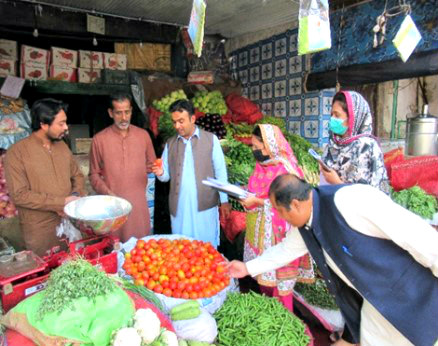
Smallholder farmers constitute a major part of the vegetable industry in Pakistan. However, these farmers cannot effectively participate and benefit from the existing vegetable supply chains due to various reasons such as social, financial and market constraints. In addition, a production-orientated mindset can also lead to poor quality and low prices.
The ‘Strengthening Vegetable Value Chains in Pakistan’ (SVVCP) project has adopted a value chain approach to improving smallholder farmers’ profits through identifying the issues and barriers in the selected vegetable supply chains in Punjab and Sindh. Importantly, it is designing interventions to deliver higher quality produce demanded by customers.
These interventions have improved the efficiency of tomato, potato and onion value chains which includes best practices of nursery, crop production, postharvest and marketing management. Three results which were consistently achieved included increased yield, improved quality and enhanced profitability of smallholder farmers.
The approaches adopted in the SVVCP project are effective in developing the capacity of smallholder farmers, project partners and the wider community. Interventions proposed by the SVVCP team were rigorously tested at pilot scale sites for three consecutive seasons (2019-22) regarding the practical feasibility and financial benefits to smallholder farmers. Initial outcomes showed the approaches were successful and yielded results.
The three sites included five villages of districts Muzafargarh, Okara, Tando Allahyar for tomato, potato and onion respectively.
A need to scale out
Despite farmers successfully adopting SVVCP approaches and best practices in SVVCP target villages, there was a need to scale out this approach to other crops and villages and training programs were designed for this purpose.
The objective of the training programs was to identify the most suitable capacity building approach that can enable project partners to upscale SVVCP approaches and best practices to smallholder farmers within five villages of Punjab and Sindh provinces in Pakistan.
The training programs were facilitated by the CABI team who have been trained and mentored by Australian experts from the University of Queensland and the Australian Centre for International Agriculture Research.
Without an effective multidisciplinary facilitation team, upscaling may not be achieved. The Extension Wing of the Agriculture Department in Punjab and Sindh plays a vital role in providing agro-advisory services and the dissemination of the latest information – mainly associated with crop production and yield increase to the smallholder farmers.
Value chain approach training
The SVVCP team intended to scale out the value chain approach among smallholder farmers – including vegetable growers – through Agriculture Extension Sindh. Therefore, training on the value chain approach is critical to achieving this.
Twenty-five agricultural extension officers (16 male and nine female) from Sindh and Punjab were provided with the opportunity to learn the value chain approach and participate in the training programs.

Some of these officers were already engaged in value chain activities.
The facilitation teams adopted two different approaches to engage the participants in the training sessions, participatory and Training of Trainer (ToT), both helping to build the capacity of extension staff and to scale out the value chain approach and best practices in the respective areas and crops – onion, potato and tomato.
The participatory approach included workshops, question and answer sessions, group activities and discussions, market visits and interactions with different value chain actors.
In the Tomato Flagship Initiative (TFI), the participatory approach was taken which immersed the extension officers in the initiative’s activities. This was opposed to having a stand-alone agri-extension officers capacity building program i.e. the Training of Trainer (ToT) approach which was adopted in the onion and potato value chain.
The focus of these capacity building activities was shifting the extension officers from a production-led to a market-led approach.
Participatory learning approach
Immersion is a participatory learning approach involving development professionals participating in the training activities undertaken for the farming community. Interactive training sessions also help gain real experience in the subject matter.
The approaches adopted include participatory action learning, field visits, ‘walking the chain’ for farmers, team members and extension officers. TFI used this approach to train extension workers. ‘Walking the chain’ is where participants experience for themselves aspects of the fruit and vegetable value chain – such as sale of the product at market by wholesalers and retailers.

An orientation workshop was divided into different technical sessions which were mainly led by an experienced Australian project counterpart team. Walking the chain activity was led by the research officer with the support of the Australian team.
This was the first practical activity for the participants to understand the value chain, value chain actors and their roles and functions and identification and evaluation of opportunities for the smallholder farmers.
The participants also had the opportunity to identify and evaluate the market opportunities for the smallholder farmers. All the participants discussed the best opportunities available for smallholder farmers to sell their quality product in the wholesale market.
Walking the chain
The participants took part in ‘walking the chain’ under the supervision of CABI staff at local wholesale markets where they interviewed commission agents, wholesalers, retailers and consumers. Women extension officers actively participated in walking the chain to learn more about markets.
Those taking part identified the expectations of the customers from the traders and market actors, their daily activities to meet those expectations and the issues and challenges to meet these requirements. The participants also identified the opportunities for the farmers in the existing value chain.
They also attended a farmer field day and learnt about the production and marketing practices and associated problems of project farmers. They then sought to see how the SVVCP project interventions could be adopted through market research and the benefits they received in terms of quality improvement, reduced field losses, increased customer satisfaction and trust on a long-term basis, and the higher profits they earned following these approaches.
Training of Trainers (ToT)
The ToT approach is intended to engage master trainers in coaching others that are less experienced with a particular topic or skill, or with training overall. A ToT workshop can build a pool of competent instructors who can then teach the material to other people. This approach was also adopted in onion and potato value chains to train extension officers.
The CABI team, through the support of Australian counterparts, familiarized the participants with basic concepts of the value chain approach, how the value chain thinking and appr
oach can help smallholder farmers overcome marketing-related issues and earn higher profits.
They also taught how gender-friendly interventions can be designed to empower rural women in the social context of Punjab and Sindh. Furthermore, the onion and potato value chain development were presented to participants as a case study to achieve improved smallholder livelihoods through the value chain approach.
Recommendations
Based on the assessments and feedback from the participants, it was concluded that the training programs familiarize them with the theory of the value chain approach. However, they may not be able to develop skills in the application of the value chain approach in one season.
The project team developed guidelines for them but an extended supervised capacity building program is required for extension workers to be able to implement a value chain approach.
A more comprehensive and extended training program based on an immersion participatory action approach – including capacity building of other services of agriculture departments such as agri-marketing, agri- research and academia – may also be needed for effective upscaling of these approaches.
Additional information
Main image: Participants ‘walk the chain’ to learn more about how a value chain approach to produce can benefit smallholder farmers (Credit: CABI).
Authors
- Dr Habat Ullah Asad – Research Officer, SVVCP
- Mr Azeem Hayder – Research Officer, SVVCP
- Dr Hafiz Mahmood Ur Rehman – Research Officer, SVVCP
- Dr Rehan Riaz – Research Officer, SVVCP
Contributors
- Dr Ximing Sun – Teams Coordinator, SVVCP
- Dr Gomathy Palaniappan – Social science Leader, SVVCP
- Dr Tony Dunne – Consultant, SVVCP
- Dr Ray Collins – Consultant, SVVCP
- Mr Muhammad Asif, Project manager, SVVCP
- Mr Qadeer Ahmad, Research Officer, SVVCP
Project page
See also the project page ‘Strengthening Vegetable Value Chains in Pakistan.’
Related News & Blogs
Strengthening the potato value chain in the Kurdistan Region of Iraq
On 30th May, we marked the International Day of Potato. In this blog, CABI’s Crop Health Advisor Anna Wood provides an update on a five-year project led by CABI to strengthen the potato value chain in the Kurdistan Region of Iraq. An ambitious five-yea…
3 June 2025




